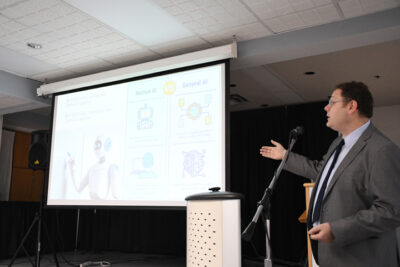AI not ready to take over the world, prof tells SACPA session
By Lethbridge Herald on April 13, 2024.
 University of Lethbridge professor Sidney Shapiro shares his views and findings on artificial intelligence during a weekly session of the Southern Alberta Council on Public Affairs.
University of Lethbridge professor Sidney Shapiro shares his views and findings on artificial intelligence during a weekly session of the Southern Alberta Council on Public Affairs.Delon Shurtz
LOCAL JOURNALISM INITIATIVE REPORTER
In the 1930s an invention called the Automat was amazing consumers everywhere.
“You put a quarter or a nickel one at at time into a machine and pressed a button, and if by magic food comes out the other side,” says Sidney Shapiro, assistant professor of business analytics at the Dhillon School of Business at the University of Lethbridge.
“People thought this is amazing, this is such advanced technology.”
Of course it wasn’t magic; behind the glass windows was a kitchen, and when someone inserted coins into the machine for a piece of pie, for example, someone else behind the glass inserted a slice of pie. A little door opened and Voila, like magic, the pie appeared.
Fast forward nearly a hundred years and people are being amazed again, and maybe even worried, this time by artificial intelligence.
“We’re kind of in that era now where people think that AI can do amazing, magical things,” Shapiro told an audience Thursday during a session of the Southern Alberta Council on Public Affairs at the Lethbridge Seniors Centre Organization.
Shapiro’s shared his views on AI and explained some of the technology behind it. He also dispelled rumours it’s going to take over the world.
“I think that although people think that it’s going to change everything and it’s going to be this huge transportive technology, in some cases that’s true, in others not so much.”
Shapiro referred to the original Star Trek TV series in the 1960s in which the crew of the Starship Enterprise would talk to a computer and it would talk back. But the technology behind that simple idea more than 60 years ago, actually still doesn’t exist.
“We have things like Alexa that in theory kind of do that, but not in a way of understanding you on an emotional level; they can’t really understand you as a person.”
Shapiro said what has significantly changed in recent years is the idea of transformers – not the movie robots – but the ability of AI to put words and sentences together and “logically” figure out what comes next.
A computer may not know what an an apple is by its description, but show the computer hundreds of images, it will be able to determine what it is. Already there are systems that can tell if someone is wearing a hardhat as that person approaches a worksite. If the person is wearing a hardhat the computer grants entry to the site, if not, it keeps the door locked. That’s because the computer as been fed thousands of images of hardhats.
The same process is used in Machine Vision, which is used in Lethbridge to detect licence plates and send the registered owners a speeding ticket in the mail. A robot can also be taught to make a cup of coffee, but while it is second nature for humans, robots require thousands of instructions.
“So by using AI we can start to skip towards the end and figure out, how can we basically say, ‘here’s where we start, an empty cup, and here’s the cup of coffee, and you figure out all the steps in between.’ “
Shapiro said many people are worried that AI is taking over the world, like Skynet in the Arnold Schwarzenneger’s Terminator movie,a
highly advanced computer system possessing AI. Once it became self-aware, it saw humanity as a threat to its existence because of attempts by Cyberdyne scientists to shut it down.
Shapiro described different kinds of AI: narrow AI, which, for example, could create a resume based on the information from thousands of other resumes; and general AI, which starts to figure things out on a level so advanced it can program itself.
“Now the thing is, this actually doesn’t exist, that’s science fiction,” Shapiro reassured his audience. “People are worried about it and they’re writing articles about it as if it existed today. It does not exist, it’s not a real thing.”
Still there are a lot of ways AI impacts society, such as the system that can detect if you’ve used your credit card to purchase something that doesn’t match previous purchases. If it does, fine, if not, it notices.
“It’s gonna set off an alert and say, ‘you just spent $13,000 on soda, that doesn’t make any sense.’ “
Shapiro said the AI simply scans all the transactions and extrapolates the information.
“In terms of general AI that can be as smart as a person, there’s no such thing, it doesn’t exist yet.”
However, Shapiro said with computers getting faster, larger and more complex, more will be possible in the future, but they will still have limitations.
25-24





[…] Source link […]